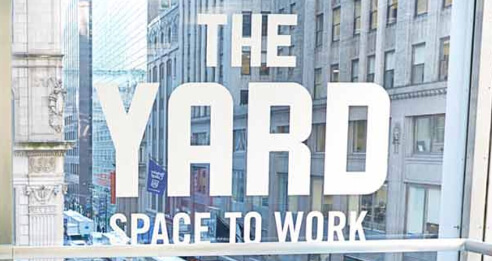
Largest Coworking Companies


While coworking does provide amazing networking opportunities, it’s also the perfect storm for conflict and personality clashes to have a negative effect on the shared space. As this new way of working becomes more mainstream, naturally, the need for a basic code of conduct in a coworking space becomes essential. It’s easy to forget how easily a bad reputation can spread beyond the confines of your own company. Loud, messy and disrespectful coworking members quickly reveal themselves in shared spaces and immediately undermine the cultural mission of the coworking concept, which is to strengthen and support community-minded professionals. And while most things related to basic manners seem like common sense, there are some soft etiquette skills that are unique to coworking spaces that may not be so obvious.
If any of these bad habits sound familiar to you or someone you know, it might be the reason for the negative energy in your coworking space and definitely something the community manager should address:
Many people join coworking spaces with networking opportunities in mind, and rightly so! Coworking becomes an instant bond with other professionals in the space and provides a natural opening to good conversation and professional inquiries. However, membership to the same coworking space doesn’t equate to instantly owing each other favors. For example, if you’re in sales and some of your coworkers seem like good potential clients, it’s not ok to push them to give you their contact lists or personal information. Don’t assume that sitting at the same table means they’re obligated to buy from you or are comfortable recommending you to their supervisor. Rather than aggressively pursuing contacts right out the gate, you should take the time to build authentic relationships with other members. Building trust and credibility over time is where the real value lies as a professional, especially in a coworking environment where word can travel fast.
Similar to the “Salesperson”, the Promoter is constantly in the business of...themselves. They might blast unsolicited emails, badger other members to follow them on social media or cover the community bulletin with their own flyers and materials. Coworking spaces provide great opportunities to learn about events in the area and other companies, but the Promoter often hogs the spotlight at networking events, treating the events as their personal platform for promoting their business or service. Promoters often forget that business connections, as a rule, should be mutually beneficial and that other members are there to work too. They often need to be reminded that they’re not the only one with a business to promote.
In a coworking space, everyone is paying for their work area, which means every square foot of desk and floorspace is a valuable asset for the coworking business. The Desk Hog regularly takes up not only their own space, but also any space around them that seems to be empty. The Desk Hog tends to forget that the coworking space is not their home, and easily loses track of their belongings because their things are spread out all over the common areas. Or worse yet, they have no problem taking up more desk space to set up that third monitor, and then get annoyed when someone asks them to kindly move. The Desk Hog can also be that person who drops their stuff on the biggest desk before heading out for a three-hour meeting, or the person that hogs all of the outlets for one desk clump. The lesson here: bring what you need of course, but keep it within the bounds of your personal space and respect the hospitality of the coworking space.
Almost every shared workspace community can relate to the Talker, the person who seems to be on the phone all day long, talking loudly in areas that are meant to be somewhat quiet. They don’t realize that other coworkers can’t focus while absorbing 30 minutes worth of chitchat coming from five feet away. Disregarding everyone else’s productivity will lead to nothing but resentment from others in the space and is a surefire way to burn some bridges in the community. If the call is going to take more than a few minutes, step into a phone booth or a conference room. Many coworking spaces have designated rooms for interviews or phone calls and designated quiet spaces.
It’s understandable that everyone needs a quiet, empty space once in a while. But taking up an entire conference room for individual business all day long is bound to annoy your coworkers. The Recluse often holes up in the conference room, avoids interaction with other people and rarely takes part in community networking events. It’s hard to know whether the recluse is just an introvert who needs a little more alone time than others, or if they’re actively avoiding being involved in the coworking community. Either way, this can be off-putting in a smaller space or more close-knit communities where members really want to form close relationships.
Most coworking spaces have some sort of guest allowance, for occasional visitors and business meetings. But the Unofficial Host abuses this privilege to the point of giving their friends and colleagues free memberships. When there’s a freeloader regularly occupying the best desks, things can get tense.
Noise level is a natural point of contention in a coworking space. People have different work styles and, while too much noise is of course something the community manager should address, expecting absolute silence all day long is a little unreasonable—especially in common areas. The Noise Police are guilty of this and perhaps aren’t clear on the fact that a coworking space is not a library. It’s a space meant for community and collaboration! But rather than pay for a private office or a space that’s dedicated to be a quiet zone, the Noise Police expect everyone in their vicinity to work by their standards and ignore the fact that some level of background noise is normal in a coworking space.
In conclusion, all of the above personas are quite common in coworking spaces. Most of the specific actions described here are pretty harmless in the grand scheme of things, and this list shouldn't be taken as an attack on the natural quirks that make everyone in your community unique. After all, it takes a village to run a coworking space! However, whenever a diverse group of people work in close quarters with each other there are bound to be conflicts. And these more extreme personalities can affect the culture of a coworking space over time, and sometimes even repel new members. Just remember that successful coworking is striking that delicate balance between these more aggressive work styles and the stale, uninspiring environment of traditional offices that you and your coworkers are trying to escape. By keeping these extreme coworking personalities in mind, it’s easier to be considerate of your fellow coworkers and get the most out of your community.
Save your community manager 41 hours each week—learn how The Yard did it with cloud-based access control.
Read the Case StudyCoworking Space Management Guide
A comprehensive guide to help you manage your coworking space.
DownloadFree access to our best guides, industry insights and more.
